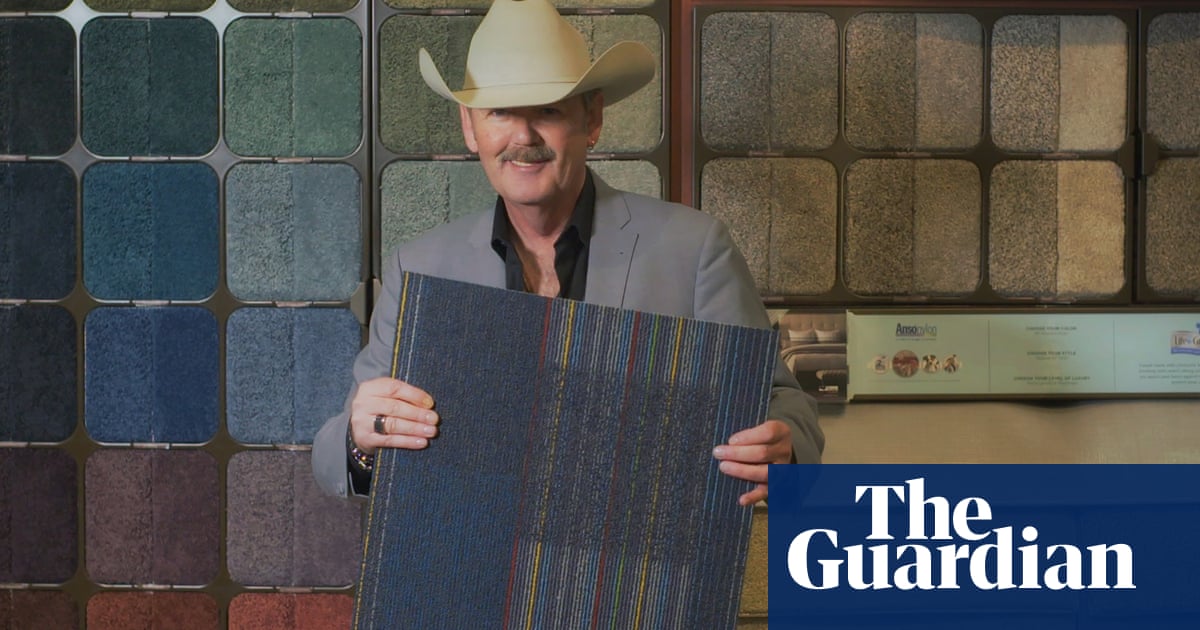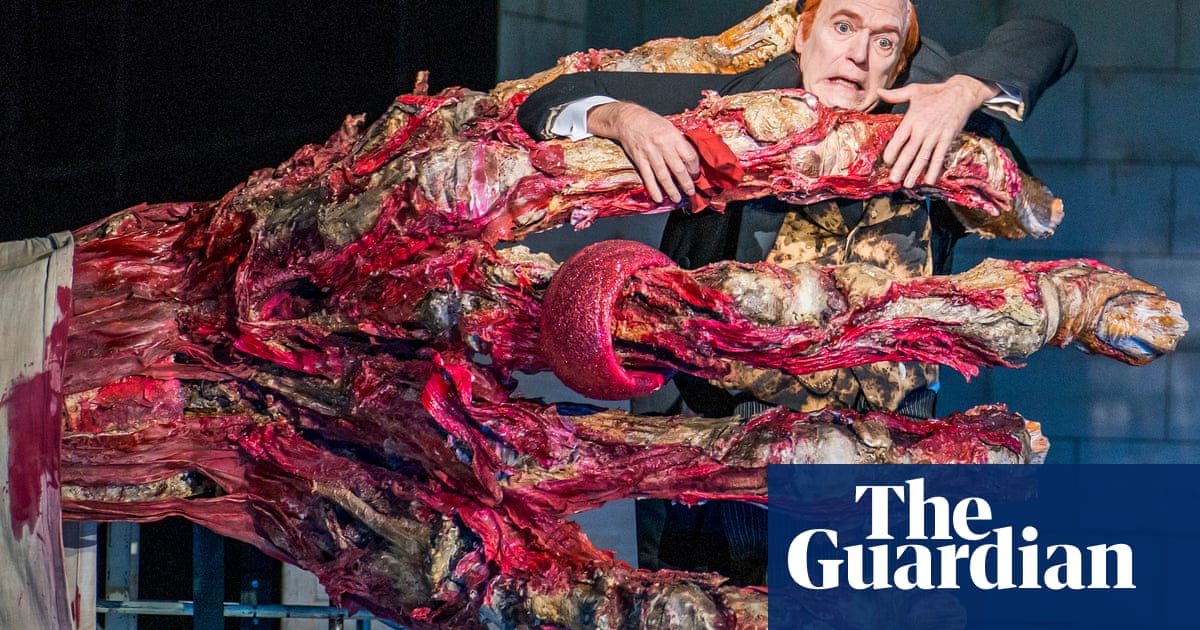
If Dalton, Georgia, did not exist, Christopher Guest would have to invent it. As the signs in the downtown area proudly declare, the 34,000-strong city is renowned as the Carpet Capital of the World, manufacturing 90% of the functional carpeting in use on Earth. The local industry attracts some eccentric characters, none more so than Roderick James, the primary subject of the enthralling new documentary Carpet Cowboys.
A Scottish émigré comes to America with dreams of textile riches, his accent sits somewhere between his native brogue and the southern twang he adopted to match his flamboyant John Wayne getups. Among his various moneymaking schemes meant to fund a reunion with his long-distance girlfriend in the Philippines, he writes jingles for a proprietary Lego adhesive synthesized by a friend’s son. Like many parts of the film, the Shark Tank clip in which a 12-year-old pitches his business model is homegrown comedy gold, primo weird Americana.
Just as Guest’s films have drawn accusations of sniggering at the provinciality of reg’lar folks, the directors Noah Collier and M Emily Mackenzie ran a similar risk with their portrait of rural oddballs. The concept began as a semi-facetious bit shared between the pair, born during late nights spent in hotel lobbies without anything else to do: they created a game of speculating on what kind of person came up with each carpet design, chuckling about opium den hallucinators envisioning the intricate patterns. “I imagined a proud guy walking down a carpet he – or she, though it was always a man in my mind – designed,” Mackenzie says over Zoom. “It was a joke that just kept turning into other jokes. Some time after, I’d moved down to Louisiana, and Noah called me to say, ‘Emily, it’s real. There’s a place where all of this comes from. I’ve been doing research on carpets and there’s this town where they all come from. We’ve got to go.’ We thought we’d go and see, maybe bring this joke into reality, explore what’s there.”
But once they put down stakes in Dalton, they quickly discovered a community of real people with real struggles, and what originated as an expedition of curiosity ripened into something more complex and deeply felt. (This same turn shapes multiple episodes of HBO’s How To With John Wilson, the creator of which came on as executive producer for Carpet Cowboys.) Their portrait of a company town under siege by corporate consolidation channels the stymied hopes of its residents, an ensemble of clever, canny experts we laugh with instead of at.
“What was important to us was to never feel any condescension toward our participants,” Collier says over Skype. “We came into it with a lot of respect for these people and their craft. The comedy that came out of it is a natural result of these guys being performers. They’re pitchmen. They’re always cracking each other up. The ways in which they’re eccentric and funny, they’re pretty aware of. It was exciting for us to find people who are so interesting and charismatic. It didn’t have to come from us. They provided, we followed.”
Mackenzie and Collier came into the process with little more than a wish list of interviews including a designer, a wholesaler, hopefully some employees at the testing facility where they rip carpets, set them on fire, and smear them with bulk-ordered excrements. “We weren’t rolling into town as a crew, ready to make a movie,” Mackenzie says. “It was Noah and I pulling up to Caldwell Carpets and asking if we could talk about the industry with them and maybe use a carpet as a backdrop.” As guests graciously welcomed into the homes of others, they prioritized humility and open-mindedness in their interviews, accepting each notion as it came rather than pursuing ideas of their own.
They crossed paths with Roderick James during this early exploratory period, which shouldn’t come as a surprise – he’s hard to miss. “When we met Roderick for the first time in Chattanooga, we were nervous about there being some hesitance,” Collier recalls. “But he and [his songwriting partner] Jon [Black] met us at the Chattanooga Choo Choo Hotel with matching cowboy hats and chaps. They were against a plate glass window, so we could only see them in silhouette … Every week, we were having these frantic conversations in parking lots of fast food restaurants, just trying to readjust and make sense of everything Roderick was giving us.”
Mackenzie adds: “On the way into that meeting, he told us, ‘I just want you to know, I’ve been waiting for this call my entire life. I’m ready.’”
Though James presented a unique film-making challenge in that the tireless hustler “drastically changed what he was doing about every three weeks” (Collier mentions an early concept for the film that followed James on a trans-China concert tour with 35 country musicians from north Georgia, just “one of maybe 12” enterprises that never came to fruition), he also embodied the difficult realities of labor and striving in a hyper-corporatized time. Like immigrants from every corner of the globe, he arrived in the States with a modest dream of carving out a living for himself, only to realize he’d come in too late. What was once a thriving hub of independent operations, many of them family-owned, had been winnowed down to a handful of mega-budgeted giants ravenously gobbling up ever-larger parcels of land. As the field inches toward monopoly, it also grows more hostile to the fantasy of newcomers with a strong work ethic.
To really put a carpet through its paces, it must be walked upon, and so some employees spend eight hours each day stepping in a circle, up and down a staircase to nowhere. The film concludes on this bleak, ridiculous tableau, a perfect visual summary of its theme of stagnation as well as its tightrope-walk between the comic and earnest. “There’s absurdity in this, the Sisyphean circles,” Mackenzie explains. “It’s funny at first, but then it stops being funny. You’re like, ‘Holy moly, this is a thing.’ But then you start thinking about this person doing this eight hours a day, and what they’re thinking about. You feel the futility of life, and that pings on broader things we internally face all the time.”
Collier chooses to see this as a testament to human willpower in the face of capitalistic adversity; one walker approaches her daily drudgery as a subsidized workout, racking up stats on her Fitbit as she makes money. James ultimately plots a reinvention elsewhere, but whatever opposition comes their way, the Daltonites continue trucking onward. With dedication so sincere as to be mockery-proof, they give the planet a good it needs, and do so with a profound sense of pride. Mackenzie and Collier returned to town for private screenings with their collaborators, but hope to organize a public showing for an obscure pocket of culture delighted to finally receive a bit of long overdue recognition.
“Everyone’s finding their way to be proud of the film,” Collier says. “Two men showed up to our first screening in full cowboy regalia, and when we asked them about it, they said, ‘This is our Barbie.’”
Carpet Cowboys is now showing at the Metrograph in New York and will open in Los Angeles on 15 September with a UK date to be announced












